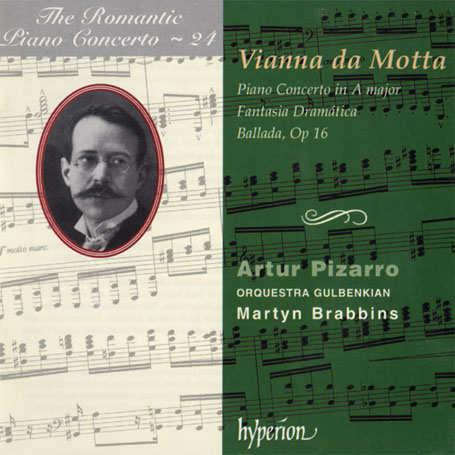Vianna da Motta Piano Concerto in A; Fantasia Dramática
A marvellously recorded programme of works by a composer once hailed as the ‘Portuguese Grieg’ and who was also one of the leading pianists of his day
View record and artist detailsRecord and Artist Details
Composer or Director: José Vianna da Motta
Label: Hyperion
Magazine Review Date: 2/2001
Media Format: CD or Download
Media Runtime: 64
Mastering:
DDD
Catalogue Number: CDA67163

Tracks:
| Composition | Artist Credit |
|---|---|
| Concerto for Piano and Orchestra |
José Vianna da Motta, Composer
Artur Pizarro, Piano Gulbenkian Orchestra José Vianna da Motta, Composer Martyn Brabbins, Conductor |
| Fantasia Dramática |
José Vianna da Motta, Composer
Artur Pizarro, Piano Gulbenkian Orchestra José Vianna da Motta, Composer Martyn Brabbins, Conductor |
| Ballada |
José Vianna da Motta, Composer
Artur Pizarro, Piano José Vianna da Motta, Composer |
Author: Guy Rickards
Hitherto, Jose Vianna da Motta (1868-1948) was quite unknown to me. Artur Pizarro’s informative note fills the main gaps: born in Africa, he was a pupil of Schaffer, Liszt and von Bulow, later becoming a leading interpreter of Beethoven and Liszt. He played with Casals, Sarasate and Ysaye and was a friend of Busoni, with whom he edited a complete Liszt edition.
Vianna da Motta’s main importance to posterity was his cultivation of non-operatic music in Portugal, his own compositions leading the way. Ironically, the larger works here scarcely contributed, the Concerto (1886-87) being premiered the day before this recording, the Fantasia dramatica (1893) played just once before. Both are early works, full of youthful exuberance. The Concerto betrays many influences, Wagner not least, but is largely Schumannesque in structure. Its unconventionality reminded me of Busoni’s early concerto (though less massive), consisting of just two movements, the variation-form second functioning as slow movement and scherzo-finale. The concerto-sized Fantasia dramatica (the largest item here) is more assured technically, switching Liszt for Schumann as model.
Vianna da Motta’s Ballada for solo piano is later still (1905), a fully mature creation in expressive design and the skill of its keyboard writing. Based on two popular songs from Portugal, it does lack the sheer vitality and fun of the works with orchestra, though its being placed between them sets it in the best possible light. The performances – firmly directed by Brabbins – are very strong (Pizarro doesn’t put a foot wrong). The superlative recording is a further plus, letting one hear even the rasp of the bassoons beneath the Fantasia’s final climax. A joy to listen to.'
Vianna da Motta’s main importance to posterity was his cultivation of non-operatic music in Portugal, his own compositions leading the way. Ironically, the larger works here scarcely contributed, the Concerto (1886-87) being premiered the day before this recording, the Fantasia dramatica (1893) played just once before. Both are early works, full of youthful exuberance. The Concerto betrays many influences, Wagner not least, but is largely Schumannesque in structure. Its unconventionality reminded me of Busoni’s early concerto (though less massive), consisting of just two movements, the variation-form second functioning as slow movement and scherzo-finale. The concerto-sized Fantasia dramatica (the largest item here) is more assured technically, switching Liszt for Schumann as model.
Vianna da Motta’s Ballada for solo piano is later still (1905), a fully mature creation in expressive design and the skill of its keyboard writing. Based on two popular songs from Portugal, it does lack the sheer vitality and fun of the works with orchestra, though its being placed between them sets it in the best possible light. The performances – firmly directed by Brabbins – are very strong (Pizarro doesn’t put a foot wrong). The superlative recording is a further plus, letting one hear even the rasp of the bassoons beneath the Fantasia’s final climax. A joy to listen to.'
Explore the world’s largest classical music catalogue on Apple Music Classical.
Included with an Apple Music subscription. Download now.

Gramophone Digital Club
- Digital Edition
- Digital Archive
- Reviews Database
- Full website access
From £8.75 / month
Subscribe
Gramophone Full Club
- Print Edition
- Digital Edition
- Digital Archive
- Reviews Database
- Full website access
From £11.00 / month
Subscribe
If you are a library, university or other organisation that would be interested in an institutional subscription to Gramophone please click here for further information.




